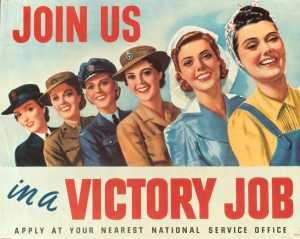
AWM ARTV00332.
Did the war change the role and place of women in Australian society?
Propaganda at the time stressed that for the first time women were being asked to do 'a man's job', either in the services or in industry. Certainly more women entered the workforce than had been there before, and many took on jobs that had previously been available to men only. These women gained all or nearly all the male rate for these 'men's jobs'. However, most of the new women workers went into traditionally female areas, where the wage was typically 54 per cent of the male rate - though by the end of the war was closer to 70 per cent.
Women who entered the services were also paid at a far lower rate than their male counterparts doing exactly the same job, and these jobs disappeared at the end of the war. The service experience, however, did have a profoundly liberating effect on many women, who then sought jobs after the war that would continue this independence and liberation. Many others, however, were happy to return to normal domestic life after the war.
Modern histories of the home front war all pay homage to the active role played by many women during the war. However, the fact also remains that the single most common women's experience of war was to remain at home, and not be employed. For many, this role took on new aspects, as women became financial heads of their households with the male breadwinner away, and this meant that many had problems giving up this responsibility after the war; but again, many were anxious and pleased to return to pre-war 'normality'. While the activities of groups such as the Women's Land Army are praised as being helpful to the war effort, we must not forget or undervalue the contribution of many thousands of farming women for whom sharing farm work was a normal and vital part of the pre-war economy. These women do not appear in statistics, but they provided far more and over a longer period of time than was provided by the new organisations.
To investigate this aspect of the Home Front experience by using evidence from the time, see Home Fronts at War, Ryebuck Media for ANZAC Day Commemoration Committee of Queensland.
More about the book HOME FRONTS AT WAR





